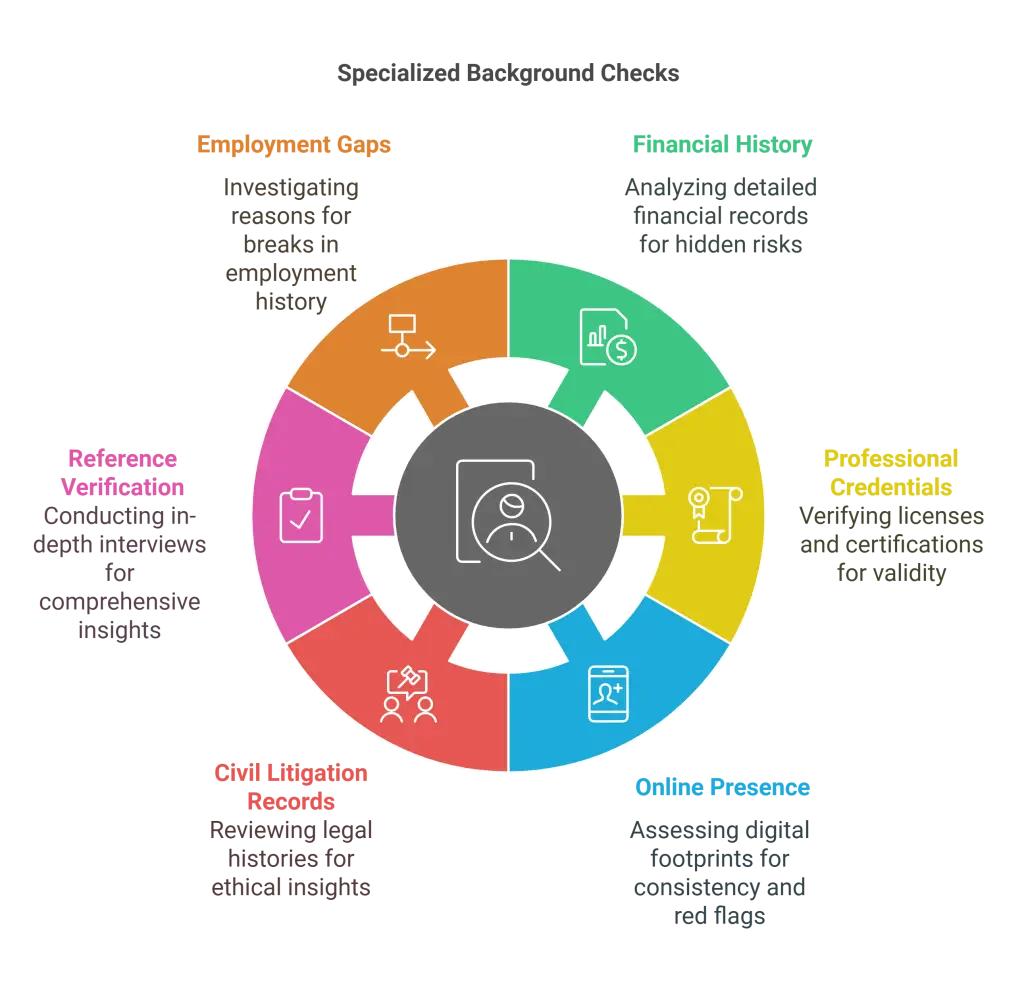When we think about background checks, we often picture a simple criminal record search or employment verification. However, standard background checks typically include just a few basic elements, such as identity verification, criminal history, and employment verification. While these are crucial, they might not be enough in certain situations.
Key Takeaways
- International Background Checks: Overcome challenges like varying data protection laws and language barriers by utilizing local resources for effective global candidate screening.
- Industry-Specific Checks: Tailor screenings to sector needs, such as sanction checks in healthcare or FINRA checks in finance, ensuring compliance and safety.
- Enhanced Criminal Searches: Access local, federal, and international records for a comprehensive view of a candidate's criminal history, uncovering offenses that might be missed in standard checks.
- Investigative Background Checks: Conduct in-person investigations and discreet inquiries for critical roles, providing invaluable insights into a candidate's suitability.
- Continuous Monitoring: Implement ongoing screening to stay ahead of risks, ensuring employees remain qualified and trustworthy throughout their tenure.
Some roles and industries require a deeper dive into a candidate’s history to ensure safety, security, and trustworthiness. This is where advanced background checks come in. This guide will explore the full spectrum of advanced options beyond the basics, helping you understand when and why they might be necessary.
EXPERT INSIGHT: It is our key responsibility as HR professionals to keep our workplaces safe and secure. Standard background checks are important but they may not be enough for higher-risk or specialized roles that's why we need the aid of advanced background checks. These checks can include financial histories, professional credentials, and social media assessments to give a complete picture of a candidate's history. Deeper background checks help us ensure that our hiring choices match our organization’s core values and standards. By using more thorough checks, we can build workplaces that are skilled, safe, trustworthy, and aligned with our long-term goals. - Charm Paz, CHRP
Specialized Background Check Items
Standard background checks provide a basic overview of a candidate’s history, but sometimes more in-depth information is necessary. Specialized background check items delve deeper into specific areas of a candidate’s past. These checks go beyond the basics, offering insights into financial history, professional credentials, online presence, civil litigation records, and more. In this section, we’ll explore the various specialized background check items that can provide a more comprehensive understanding of a candidate’s suitability for a role.
Financial History Deep Dive
Standard credit reports are helpful, but sometimes you need more. A deep dive into a financial history goes beyond just credit scores. This includes looking into investment accounts, tax liens, bankruptcy details, and business ownership or affiliations. For roles involving financial responsibility, this in-depth review ensures no hidden financial risks could affect job performance or integrity.

Professional License & Credential Verification
Verifying these claims is essential in professions requiring specific licenses or credentials. Advanced background checks ensure that a candidate's qualifications are valid and up-to-date. This includes confirming professional licenses and certifications and checking ongoing education requirements' status. This step helps prevent hiring individuals with falsified or outdated credentials.
Social Media & Online Presence Analysis
In today’s digital age, a person’s online presence can provide significant insights into their character and behavior. Social media and online presence analysis involve vetting digital footprints for red flags or inconsistencies. This includes checking social media profiles, blog posts, and other online activities to ensure the candidate’s online persona aligns with their professional one. It’s essential for roles involving public relations or any form of public representation.
Civil Litigation Records
Civil litigation records can reveal much about a person’s history that criminal records might not show. This includes uncovering lawsuits, disputes, or legal actions that the individual has been involved in. Such information can be critical, especially in roles requiring high ethical standards or where the candidate will manage legal or financial matters.
Reference Interviews & Verification
Going beyond listed references can provide a fuller picture of a candidate’s background. Advanced background checks involve in-depth reference interviews and verification. This means calling the provided references and contacting others who might have worked with the candidate. It helps gather a comprehensive view of the candidate’s work ethic, performance, and behavior in different professional settings.
Employment History Gaps
Periods of unemployment can be concerning for employers. Advanced background checks address employment history gaps with additional research. This involves verifying the reasons for gaps and ensuring no hidden issues, such as unreported employment or legal troubles. It helps better understand the candidate’s career trajectory and make informed hiring decisions.
Advanced Search Options and Techniques
Background checks need to evolve beyond traditional methods in an increasingly global and complex world. Advanced search options and techniques allow a more thorough examination of a candidate’s background. From international background checks to industry-specific verifications, enhanced criminal searches, investigative background checks, and continuous monitoring, these advanced techniques provide deeper insights and mitigate risks more effectively. This section will detail these sophisticated approaches, explaining their importance and applications in different scenarios.
International Background Checks: Unlocking Global Insights
- Overcoming Barriers: Conducting international background checks presents unique challenges. Varying data protection laws, such as GDPR, cultural differences, language barriers, and the lack of centralized records in some countries can complicate the process. Understanding and navigating these barriers is crucial for obtaining accurate information.
- Verification Strategies: Local resources are essential for effective international checks. This includes hiring in-country investigators, accessing specialized databases, and understanding international criminal records systems like Interpol. Additionally, verifying educational credentials from foreign institutions ensures that the candidate’s qualifications are legitimate and recognized.
- When to Use: International background checks are vital when hiring foreign nationals, placing employees abroad, or working with international partners and clients. They help ensure that individuals meet the same standards as domestic hires, providing peace of mind and reducing risk.
Industry-Specific Checks: Tailoring to Your Sector

- Healthcare: Specific checks are crucial in the healthcare sector. Sanction checks, such as those from the Office of Inspector General (OIG) and the System for Award Management (SAM), help identify individuals barred from participating in federal healthcare programs. Verifying medical licenses, DEA registration for controlled substances, and a history of malpractice suits are also essential to ensure the safety and trustworthiness of healthcare professionals.
- Finance: Specialized checks are necessary to ensure compliance and trust in the finance industry. This includes conducting FINRA checks for securities industry professionals, deep-dive checks into credit history, and verification of certifications like CFA and CFP. These steps help prevent financial misconduct and ensure that professionals meet the industry’s stringent standards.
- Education: Verifying teaching credentials is vital in the education sector. This includes checking for disciplinary actions and conducting sex offender registry searches. Ensuring educators have valid and unblemished credentials is crucial for maintaining a safe and reputable educational environment.
- Other Industries: Other regulated fields, such as transportation and government contracting, require specialized checks. For transportation, this includes Department of Transportation (DOT) compliance checks. In government contracting, security clearances are necessary. These tailored checks help ensure that individuals meet industry-specific standards and regulations.
Enhanced Criminal Searches: Beyond the Surface
- Local Databases: Local databases often contain information not included in national databases. Searching county and state court records can reveal offenses that might go unnoticed. This detailed approach helps provide a more comprehensive view of a candidate’s criminal history.
- Federal Records: Accessing federal court records is crucial for uncovering offenses prosecuted at the federal level, such as white-collar crimes and interstate offenses. This adds another layer of depth to criminal background checks, ensuring no critical information is missed.
- International Databases: International criminal records search through Interpol and other sources can reveal global offenses. While these searches have limitations and potential legal issues, they are essential for roles with international implications or candidates with a worldwide presence.
Investigative Background Checks: Deep Dives for Critical Roles
- In-Person Investigations: For high-level positions or sensitive roles, in-person investigations by trained investigators can provide invaluable insights. This includes conducting interviews, surveillance, and asset checks. Such thorough investigations help ensure that the candidate is thoroughly vetted and trustworthy.
- Discreet Inquiries: Investigative checks can be conducted discreetly to avoid alerting the candidate or their current employer. This ensures the investigation does not disrupt the candidate’s current position or cause unnecessary concern.
- When to Use: Investigative checks are recommended for executive-level hires, positions with significant financial responsibility, or roles requiring high trust. They help ensure that these critical positions are filled by the most qualified and trustworthy individuals.
Continuous Monitoring: Staying Ahead of Risk
- Ongoing Screening: Regular background checks, conducted quarterly or annually, help monitor for new criminal activity, professional license issues, or other employee profile changes. This ongoing screening helps mitigate risks and ensures employees remain qualified and trustworthy.
- Legal Compliance: It’s important to obtain employee consent for continuous monitoring and comply with relevant laws and regulations. This ensures that the monitoring process is legally sound and respects employee privacy.
- Use Cases: Continuous monitoring is valuable for employees accessing sensitive data, financial assets, or vulnerable populations. It helps maintain a high standard of security and trust within the organization.
Conclusion
Advanced background checks go beyond the basics to provide a comprehensive view of a candidate’s history and qualifications. These advanced options offer significant value in certain situations: specialized searches, international checks, or continuous monitoring. Understanding the full range of available checks ensures you can choose the one that best suits your needs and risk profile. By utilizing advanced background checks, you can make more informed hiring decisions, enhance security, and protect your organization’s reputation.

